INTERNACIONAL
Atentado en Colombia: afirman que Uribe Turbay pidió nueve veces mayor protección y el gobierno nunca respondió

INTERNACIONAL
Israel’s Netanyahu holds on to power, attempt to dissolve government falls short

NEWYou can now listen to Fox News articles!
Israeli Prime Minister Benjamin Netanyahu and his coalition have faced the most serious challenge to their power since Oct. 7 after a bill to dissolve parliament and call for early elections failed.
This is more than a momentary victory: under Israeli law, the bill’s failure means that no other proposal to dissolve the Knesset (parliament) can be introduced for six months, buying Netanyahu and his coalition some time.
Israeli Prime Minister Benjamin Netanyahu, Foreign Minister Israel Katz and Israeli Finance Minister Bezalel Smotrich attend a Plenum session of the Knesset, Israel’s Parliament, in Jerusalem, June 11, 2025. (REUTERS/Ronen Zvulun)
NETANYAHU COALITION THREATENED BY CONSCRIPTION STANDOFF WITH RELIGIOUS PARTIES
Ultra-Orthodox lawmakers had threatened to dissolve the government amid a deadlock over exemptions to military service. According to the Associated Press, most of the ultra-Orthodox members of the Knesset agreed to vote against the bill after reaching a compromise with MK Yuli Edelstein, who leads the Knesset Foreign Affairs and Defense Committee. Discussions about the new draft law will reportedly continue over the coming week.
Edelstein has been a vocal opponent of any bill that would enshrine the ultra-Orthodox military service exemption into Israeli law, according to the Times of Israel.
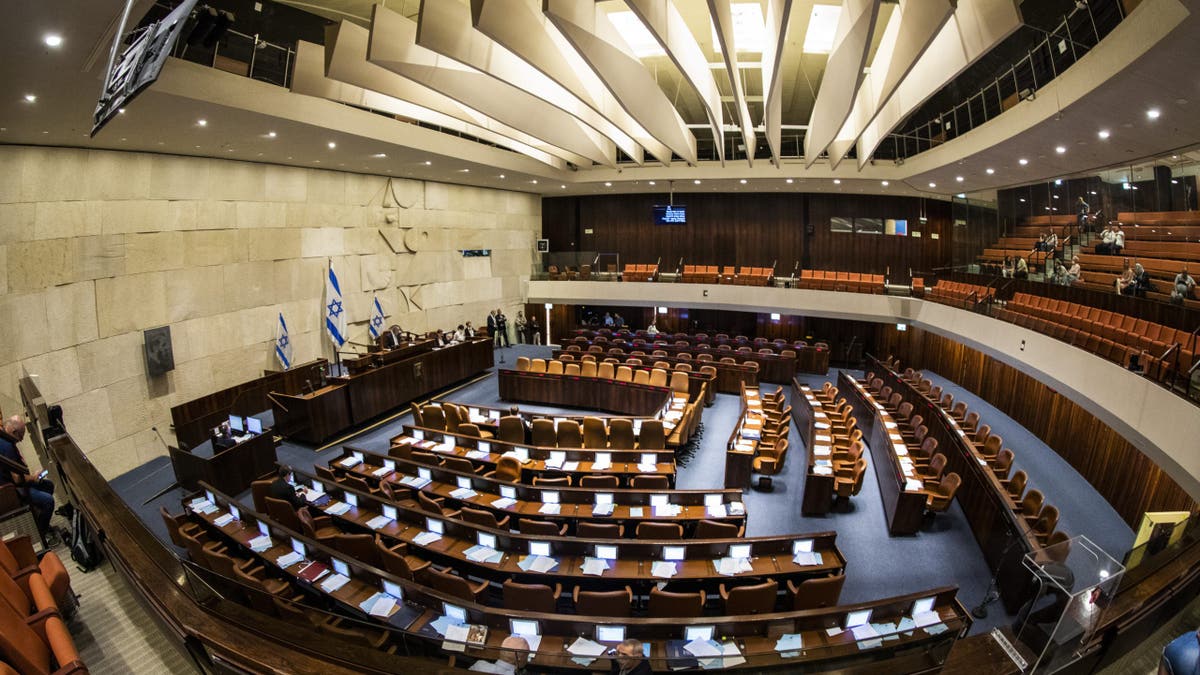
A general view of the empty plenary chamber of the Israeli Knesset. (Ilia Yefimovich/picture alliance via Getty Images)
NETANYAHU ACCUSES ISRAELI POLICE OF TRYING TO ‘TOPPLE’ HIS GOVERNMENT
While Israel requires citizens to enlist in the military at age 18, several groups are exempt—including the ultra-Orthodox community, also known as Haredim—which makes up roughly 13% of Israeli society, according to the Associated Press.
The Israel Defense Forces (IDF) have Haredi units, which allow soldiers to follow religious traditions more strictly than other parts of the army. However, many Haredim choose to study Torah instead.
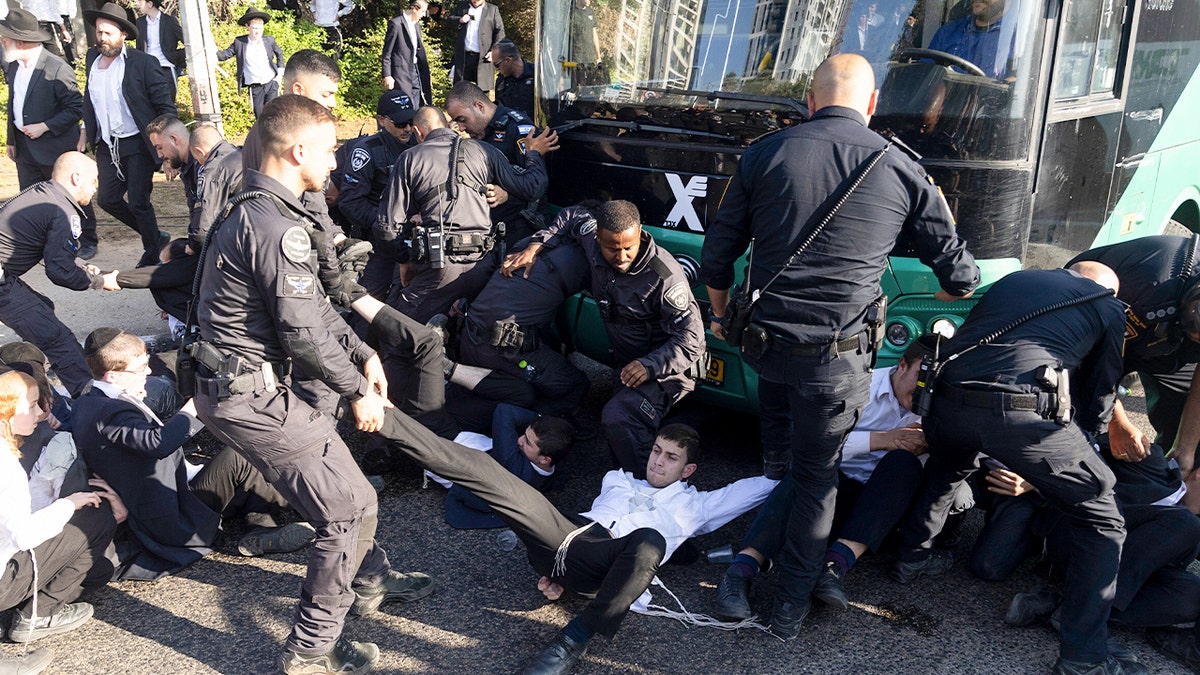
Ultra-Orthodox Jewish men clash with police officers as they block a main highway during a demonstration against drafting to the Israeli army on June 5, 2025, in Bnei Brak, Israel. (Amir Levy/Getty Images)
CLICK HERE TO GET THE FOX NEWS APP
Opposition leader and former Prime Minister Yair Lapid said the government «spat in the faces» of Israeli soldiers and «sold out our troops» with the compromise, the Times of Israel reported. The outlet added that Edelstein stated that the only way to get an «effective bill like this leading to an expansion of the IDF’s conscription base» would be through his committee.
The issue of religious exemption has been a debate among Israelis for decades, but it has become especially heated since Hamas’ Oct. 7 massacre.
Israel is currently fighting the longest war in its history as the country marks 20 months of its ground operation in Gaza. Israelis from all walks of life have been called up to the reserves throughout the war, fueling frustration with the Haredi community’s exemption.
INTERNACIONAL
Alivio para Benjamin Netanyahu: el Parlamento de Israel rechaza disolver el gobierno y anticipar las elecciones

Tras una larga sesión que comenzó el miércoles a la tarde y terminó a altas horas de la madrugada del jueves, el Parlamento de Israel rechazó, por una estrecha mayoría un proyecto de ley presentado por la oposición para disolver el cuerpo legislativo. El resultado le trae una bocanada de aire al primer ministro Benjamin Netanyahu, que de otro modo habría tenido que llamar a elecciones anticipadas.
Votaron contra el texto 61 de los 120 diputados del Knsset, y 53 lo hiceron a favor, en una lectura preliminar. La oposición, liderada por el partido Yesh Latid, necesitaba los votos de dos facciones ultraortodoxas que forman parte del gobierno de Netanyahu y que habían amenazado con retirarle su apoyo por su lentitud para aprobar una ley que permita eximir a gran parte de los judíos ultrarreligiosos de hacer el servicio militar obligatorio.
La oposición presentó el proyecto cuando la mayoría aparecía desunida sobre la polémica conscripción de judíos ultraortodoxos, y esperaban derrotar al gobierno atrayendo a los partidos ultraortodoxos aliados al primer ministro.
Los partidos Shas y Judaísmo Unido de la Torá (JUT) amenazaron con sumarse a la iniciativa debido a su oposición a la ley de reclutamiento, que busca terminar con la exención del servicio militar para los judíos ultraortodoxos.
Medios locales informaron el jueves que la mayoría de los legisladores ultraortodoxos terminaron por votar en contra de la propuesta para disolver el Parlamento.
Durante décadas, los ultraortodoxos se han beneficiado de una exención del servicio militar, un privilegio cada vez más criticado en la sociedad israelí, en plena guerra con el movimiento ultraislámico palestino Hamas en la Franja de Gaza desde el 7 de octubre de 2023.
Antes de la votación, el presidente de la comisión de Relaciones Exteriores y Defensa de la Knesset, Yuli Edelstein, publicó en X que se había alcanzado un acuerdo sobre el proyecto de reclutamiento de ultraortodoxos, sin dar detalles.
«Estoy feliz de anunciar que, después de largas discusiones, hemos llegado a un acuerdo sobre los principios básicos de un proyecto de ley sobre la conscripción», indicó el legislador del partido derechista Likud, de Netanyahu.
Los ultraortodoxos quieren que el gobierno apruebe un plan que permita mantener gran parte de las exenciones militares a los miembros de su comunidad que, desde la fundación del Estado de Israel, permitían a los judíos que estudiaban a tiempo completo en una escuela religiosa no hacer el servicio militar obligatorio.
En junio de 2024, tras expirar la disposición temporal que permitía las exenciones (el asunto nunca había sido ratificado por ley), el Tribunal Supremo ordenó al Ejército comenzar a alistar a los ultraortodoxos, lo que obligó al gobierno a poner en marcha una propuesta de ley para mantener gran parte de las exenciones, aunque también contempla el alistamiento de algunos ultrarreligiosos.
La propuesta, sin embargo, lleva meses bloqueada en el Parlamento por diferencias en el seno de la coalición gobernante sobre su alcance y los mecanismos para hacerla cumplir.
La exención militar de los ultraortodoxos es un asunto polémico en Israel, aún más desde que comenzó la guerra en la Franja de Gaza, que ha llevado al gobierno a prolongar la duración del servicio militar obligatorio y a movilizar a decenas de miles de reservistas para mantener su ofensiva.
Con el fracaso, la oposición tendrá que esperar seis meses para presentar otra iniciativa similar.
Pero el ministro de Finanzas, Bezalel Smotrich, de extrema derecha, declaró durante la sesión del Knesset que derribar al gobierno en tiempo de guerra constituiría un «peligro existencial» para Israel.
«La historia no perdonará a quien lleve al Estado de Israel a elecciones en tiempo de guerra», declaró.
El gobierno de Netanyahu se sustenta en una alianza entre el Likud, grupos de extrema derecha y los partidos ultraortodoxos, y la salida de cualquiera de los movimientos provocaría la caída del gobierno.
El resultado de la votación en el Parlamento trae alivio a Netanyahu, que enfrenta desde hace meses protestas en su contra y está cada vez más cuestionado dentro de su propia coalición de gobierno.
La disolución de la Knesset suponía el paso previo para convocar elecciones anticipadas, pero su permanencia le permite ganar tiempo a un Netanyahu, mientras intensifica la ofensiva en Gaza para «aniquilar» a Hamas.
Fuente: agencias AFP y EFE
Israel,Benjamín Netanyahu
INTERNACIONAL
House bipartisan bill directs NSA to create ‘AI security playbook’ amid Chinese tech race

NEWYou can now listen to Fox News articles!
FIRST ON FOX – Rep. Darin LaHood, R-Ind., is introducing a new bill Thursday imploring the National Security Administration (NSA) to develop an «AI security playbook» to stay ahead of threats from China and other foreign adversaries.
The bill, dubbed the «Advanced AI Security Readiness Act,» directs the NSA’s Artificial Intelligence Security Center to develop an «AI Security Playbook to address vulnerabilities, threat detection, cyber and physical security strategies, and contingency plans for highly sensitive AI systems.»
It is co-sponsored by House Select Committee on China Chairman Rep. John Moolenaar, R-Mich., Ranking Member Rep. Raja Krishnamoorthi, D-Ill., and Rep. Josh Gottheimer, D-N.J.
LaHood, who sits on the House Intelligence Committee and the House Select Committee on China, told Fox News Digital that the legislative proposal, if passed, would be the first time Congress codifies a «multi-prong approach to ensure that the U.S. remains ahead in the advanced technology race against the CCP.» He said the bill will improve export control mechanisms – including for chips and high capacity chip manufacturing – protect covered AI technologies with a focus on cybersecurity, and limit outbound investment to firms directly tied to the Chinese Community Party or China’s People’s Liberation Army.
CHINESE BIOWEAPON SMUGGLING CASE SHOWS US ‘TRAINS OUR ENEMIES,’ ‘LEARNED NOTHING’ FROM COVID: SECURITY EXPERT
Rep. Darin LaHood, R-Ill., leaves the House Republican Conference meeting at the Capitol Hill Club in Washington, D.C., on Tuesday, May 17, 2022. (Bill Clark/CQ-Roll Call, Inc via Getty Images)
«We start with the premise that China has a plan to replace the United States. And I don’t say that to scare people or my constituents, but they have a plan to replace the United States, and they’re working on it every single day. And that entails stealing data and infiltrating our systems,» LaHood told Fox News Digital. «AI is the next frontier on that. We lead the world in technology. We lead the world when it comes to AI. But what this bill will do will again make sure that things are done the right way and the correct way, and that we’re protecting our assets and promoting the current technology that we have in our country.»
LaHood pointed to evidence uncovered by the committee that he said shows the CCP’s DeepSeek used illegal distillation techniques to steal insights from U.S. AI models to accelerate their own technology development. He also pointed to how China allegedly smuggled AI chips through Singapore intermediaries to circumvent U.S. export controls on the technology.
«As we look at, ‘How do we win the strategic competition?’ I think most experts would say we’re ahead in AI right now against China, but not by much. It is a short lead,» LaHood told Fox News Digital.
He said he is confident the bill will put the U.S. «in the best position to protect our assets here and make sure that we’re not shipping things that shouldn’t go to AI that allow them to win the AI race in China.»
«Whoever wins this race in the future, it’s going to be critical to future warfare capabilities, to, obviously, cybersecurity,» LaHood continued. «And then, whoever wins the AI competition is going to yield really unwavering economic influence in the future. And so we’re aggressive in this bill in terms of targeting those areas where we need to protect our AI and our companies here in the United States, both on the commercial side and on the government side, to put us in the best position possible.»
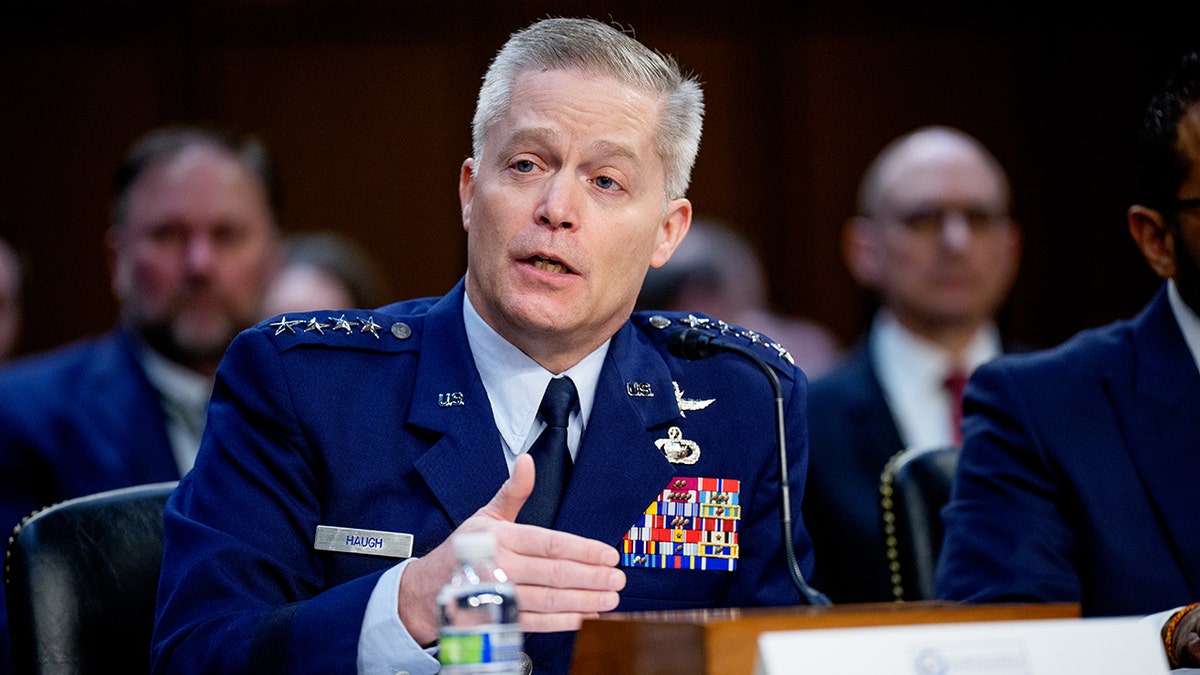
National Security Agency Director Gen. Timothy Haugh speaks during a Senate Committee on Intelligence Hearing on March 25, 2025 in Washington, D.C. (Andrew Harnik/Getty Images)
The legislative proposal calls on the NSA to develop a playbook that identifies vulnerabilities in AI data centers and developers producing sensitive AI technologies with an emphasis on unique «threat vectors» that do not typically arise, or are less severe, in the context of conventional information technology systems.» The bill says the NSA must develop «core insights» in how advanced AI systems are being trained to identify potential interferences and must develop strategies to «detect, prevent and respond to cyber threats by threat actors targeting covered AI technologies.»
AMAZON ANNOUNCES $20B INVESTMENT IN RURAL PENNSYLVANIA FOR AI DATA CENTERS
The bill calls on the NSA to «identify levels of security, if any, that would require substantial involvement» by the U.S. government «in the development or oversight of highly advanced AI systems.» It cites a «hypothetical initiative to build covered AI technology systems in a highly secure government environment» with certain protocols in place, such as personnel vetting and security clearance processes, to mitigate «insider threats.»
Though not directly related, the legislation is being introduced a week after FBI Director Kash Patel sounded the alarm on how the CCP continues to deploy operatives and researchers to «infiltrate» U.S. institutions. Patel laid out the risk in announcing that two Chinese nationals were charged with smuggling a potential bioweapon into the U.S.
LaHood said that case further highlights «the level of penetration and sophistication that the CCP will engage in,» but he added that his bill focuses on putting a «protective layer» on U.S. AI tech and «restricting outbound investment to China.» He pointed to how the CCP also has bought up farmland around strategic U.S. national security locations, particularly in Montana, North Dakota and South Dakota.
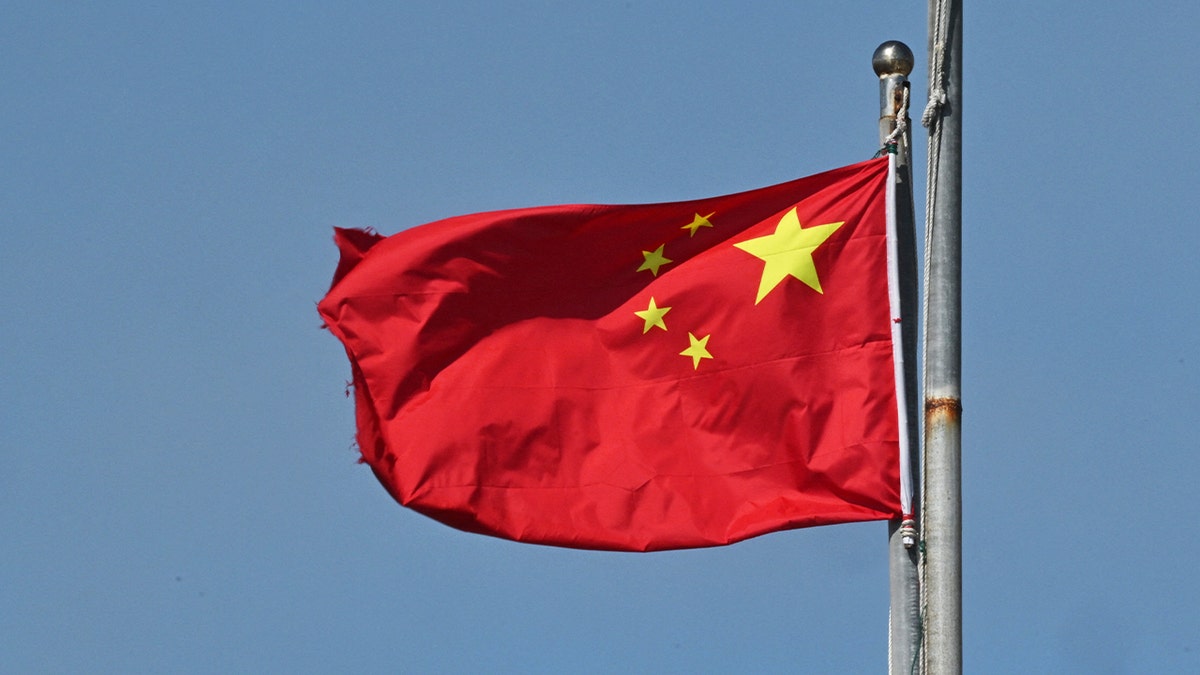
Rep. Darin LaHood, R-Ind., said China’s goal is to replace the United States. (ADEK BERRY/AFP via Getty Images)
«If everything was an even playing field, and we were all abiding by the same rules and standards and ethical guidelines, I have no doubt the U.S. would win [the AI race], but China has a tendency and a history of playing by a different set of rules and standards,» LaHood said. «They cheat, they steal, they take our intellectual property. Not just my opinion, that’s been factually laid out, you know, in many different instances. And that’s the reason why we need to have a bill like this.»
The bill comes as the Trump administration has been pushing to bolster artificial intelligence infrastructure in the United States, and major tech companies, including Amazon, Nvidia, Meta, OpenAI, Oracle and others, have made major investments in constructing AI-focused data centers and enhancing U.S. cloud computing. Last week, Amazon announced a $20 billion investment in constructing AI data centers in rural Pennsylvania. It followed a similar $10 billion investment in North Carolina.
CLICK HERE TO GET THE FOX NEWS APP
In late May, the NSA’s Artificial Intelligence Security Center released «joint guidance» on the «risks and best practices in AI data security.» The recommendations include implementing methods to secure the data used in AI-based systems, «such as employing digital signatures to authenticate trusted revisions, tracking data provenance, and leveraging trusted infrastructure.» The center said its guidance is «critically relevant for organizations – especially system owners and administrators within the Department of Defense, National Security Systems, and the Defense Industrial Base – that already use AI systems in their day-to-day operations and those that are seeking to integrate AI into their infrastructure.»
-

 POLITICA3 días ago
POLITICA3 días agoCristina Kirchner habla en sede del PJ a la espera de la decisión de la Corte Suprema por la causa Vialidad
-

 POLITICA2 días ago
POLITICA2 días agoLa Libertad Avanza renunció al aumento de sueldos en el Senado y se reaviva la polémica por el decreto que sube las dietas
-
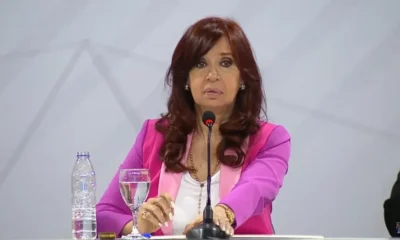
 POLITICA2 días ago
POLITICA2 días agoCristina Kirchner fue condenada a seis años de prisión e inhabilitación perpetua para ejercer cargos públicos
















